- Home
- Jean Stone
Twice Upon a Wedding Page 9
Twice Upon a Wedding Read online
Page 9
“Sarah!” she called. “It’s me. Elaine!”
Sarah was hunched over her drawing table, scraps of fabric at her elbow, spray-painted white-and-silver twigs standing upright in tall, clear glass vases filled not with water but cranberries. Elaine supposed they were decorating ideas for the Benson wedding.
Sarah turned toward Elaine’s voice, then gathered her long, shining ebony hair and knotted it into a bun. She stared at Elaine. She blinked.
“It’s me!” Elaine repeated. She twirled around as if she were four or five again, spinning in front of the full-length, oval mirror in her parents’ bedroom, watching as her dress and its layers of petticoats twirled straight out. “Do I look divine?” It was a Lily-word, but Lily wouldn’t mind.
“Good God, Elaine. What have you done?”
Elaine abruptly stopped spinning.
“She has completed steps one and two of her fabulous makeover,” Lily announced as she made her way down the stairs that went from her apartment on the second floor straight into Sarah’s studio. “A week at the spa and a new wardrobe.”
Elaine stepped back and let Lily into the room.
Sarah made no comment. She looked from Lily back to Elaine, then back to Lily again.
“Well?” Lily inquired. “It’s quite amazing, isn’t it?”
“Personally, I’ve never wanted to be a blonde.” Sarah turned back to her work.
“It’s not about being a blonde. It’s about total transformation. It’s about all of us helping Elaine reach her full potential by teaching her about the finer things in life.”
Elaine felt as if she weren’t in the room.
“It looks blond to me,” Sarah said.
“If changing what’s on the outside helps her look at herself in a more positive way, then that’s all that matters,” Lily continued. Her hands were on her narrow hips now, the blush in her cheeks rising to an anger-pinkness. “We’re all going to help, Sarah. You included.”
“Swell. I’ll show her how to make jewelry. She ought to have it mastered by Thursday.”
Of all the roommates, Sarah had sometimes been the moody one. Lily had excused it with comments about “creative” and “artistic.” But right then, Lily didn’t look as if she cared about excuses.
“Sarcasm does not become you,” Lily said.
“Right. I keep forgetting you’re our in-house expert on everything.”
Lily and Sarah had gone at it two or three times over the years, head-to-head, fisticuffs, as Elaine’s father would have called it. This time, Elaine stepped forward.
“Please,” she said, “stop arguing. It’s not that important.”
“Yes, it is,” Lily said.
“I’m with Elaine,” Sarah said. “It’s not that important.”
She said it without lifting her head; she said it in a way that made Elaine feel as if she was the one that wasn’t important, that her desire to better herself plainly didn’t matter.
“Just forget it,” Elaine said quietly, leaving the studio, walking through the showroom where Andrew sat, bewildered, and out the front door. The last thing she heard was the small bell announcing her exit.
Jo hadn’t wanted to go to work Monday. She would have preferred to stay home, burrow under her blankets, and continue to nurse her Jack Allen wounds as she’d been doing since Saturday night.
Upon his announcement that “Mavie” was indeed his wife, Jo had allowed herself only a brief moment for introspection, then she’d headed for the door. She ignored his remark about narrow-minded Americans, told him to drop dead, and retrieved her thirty-dollar bottle of wine on her way out.
He had the audacity to look insulted.
But that had been then and now it was a new week, and Jo knew she had to collect the pieces of her ego and resume her life. She pulled two suitcases from the closet: They should hold enough clothes to last a week or two. There was no way she would risk running into Jack in the garage of the secretaries’ building. Not until she was certain he could not charm her again with his clever notes and his crooked smile and his liquidy eyes.
As Andrew had reminded her, her mother and Ted would not return from their honeymoon for a while. Which meant Jo could stay at her mother’s house, and not have to answer anyone’s questions.
The gazebo on the town green was used to hawk tourist information and as a minibandstand Wednesday nights in summer. Funded by the arts council, the concerts were eclectic: big-band music one week, Dixieland another week, then a sing-along with a barbershop quartet. When he wasn’t doing Shakespeare, Martin liked to go. He was older than Elaine and it was always more his kind of music.
She had gone with him because that’s what a wife-to-be did, not that it was a sacrifice. After the divorce, she’d felt disconnected from the community; Martin had helped her feel she belonged again. It was nice to share cans of soda and crackers and cheese and town gossip. It had reminded Elaine of Saratoga, back when she’d been a young girl.
For no special reason, Elaine walked to the gazebo now. She sat on a bench next to the rack of maps and brochures of area attractions. She didn’t care about getting dirt on her Ann Taylor pants.
Leaning forward a little, Elaine clenched her jaw. She gazed around the town common. Most of the maples had already lost their red and gold leaves; the amber oak leaves would soon add a topcoat to the ground and the sidewalks that meandered through the grass.
She thought about Martin. It was nice that he enjoyed simple, easy things like town concerts and holding hands and making her feel special even when she did not. He’d been eons away from Lloyd when it had come to that. She missed Martin sometimes.
She thought about Lloyd. Was it sadder that he was pursuing her, or sadder that she didn’t care?
She thought about Sarah. Why had her approval seemed so important, her disapproval so earth-shattering?
Elaine had never handled unhappiness well, especially in autumn, when the horse people had left and then the leaf peepers had, too, and all that was left was the bleak promise of winter and its gray skies and cold.
Autumn was when her mother had died. October twenty-third, ten years ago.
She lowered her head, hating that Sarah had snuffed out her good mood and dredged up the uglies again. The memories, the losses, the season.
“Mind if I join you?”
19
Elaine flicked away her tears so Andrew wouldn’t see. She patted the bench beside her. “This part is clean.”
He sat down and picked up a brochure for Six Flags New England. “As if life isn’t enough of a roller coaster,” he said, pointing to the brochure. “This place has eight of them.”
Elaine smiled. “Sarah thinks my makeover is foolish.”
“One person’s opinion.”
“Two. Counting my daughter.” She swept away a maple leaf with the toe of her shoe. “Karen is pulling away from me. She’s moving closer to her father, and I hate that.”
“It’s the newness,” Andrew said. “Kids feel threatened when something is new. They worry about how it’s going to shake up their lives.” He put the brochure back in the rack, picked up another for the Norman Rockwell Museum.
“What’s Sarah’s excuse?”
“She’s a woman. You know how they are.”
Elaine appreciated that he was trying to make her laugh. “All my life I’ve wanted to please everyone,” she said. “First my mother and father, then the customers at our restaurant, then Lloyd and the kids, then Martin. Now I feel as if I’m supposed to please Lily, Sarah, and Jo. And you.”
Andrew laughed. “Me?” He returned the brochure and put his hand on hers. “Lainey, before you change too much more of your life, you need to learn what you really want. Not what other people want. Or what you think they want.”
“I want to be here. I want to work at Second Chances. And I do want my life to change. Really I do.”
“Good. Then to hell with what anyone else thinks.”
“Lily is supportive. And
you are,” she added. “Thanks.”
He smiled. “Jo is, too,” he said. “She even said so on our weird trip to the spa.”
“That was quite an escapade.”
“Yes, well, it’s the story of my life.”
Elaine smiled, then drew in an uncertain breath. “Speaking of life stories,” she said, “my father had a restaurant, a very nice restaurant. Lily thinks I should find out what he did for weddings and banquets. She thinks he might have some clever things we can offer our brides.”
“Such as?”
“I don’t know, but he was quite a chef. He had some wonderful recipes.” She pictured her mother at the kitchen table late at night, her hair teased into a perfect sixties-bubble, her flowered shirtwaist dress covered by a neat apron, her feet in penny loafers, crossed at the ankles. She listened to the radio, to Frank Sinatra and Dean Martin, while she carefully pasted the recipes into large, three-ring binders.
“You could ask,” Andrew said. “It wouldn’t hurt.”
She hadn’t called him over the weekend. She’d thought of it once, twice, maybe three times. But she was so busy with her online shopping. And procrastinating was always so much easier, like with car oil changes and dental appointments. “I suppose it would help me contribute something worthwhile to the business.”
Andrew let out a laugh. “You already contribute, Elaine. You know people in this town it would take the others decades to get to meet.”
She ignored the compliment. “My father lives in Saratoga Springs. I’d have to go there and see what he has.”
“What are you waiting for?”
She buttoned and unbuttoned the bottom button of her new sweater. “Bob McNulty always seemed larger-than-life. I was a disappointment to him. Over the years we’ve kind of drifted apart.”
A pigeon flew under the gazebo. It looked at Elaine, then Andrew, then flew away. “I guess I could drive up Saturday,” Elaine continued. “The visit could be part of my makeover. The new me. No more skeletons—or polyester— hidden in my closet.”
Andrew laughed again. “Conflict happens, Lainey. It’s part of life.” Then he gestured back toward the shop. “Believe me, it’s better to face it than let it get the better of you.”
He meant, of course, Sarah.
Elaine went back to work because she knew Andrew was right. No sense turning a small difference of opinion into a major disaster.
She settled in at her desk and took out a fistful of menus they’d already collected from caterers from West Hope to the New York State border. Nine-fifty each for Shrimp Cocktail Diablo—which was merely four shrimp with a cheap jalapeño sauce; twenty-four ninety-five for a platter of a dozen Beef Teriyaki with hot honey mustard; Asian Lettuce Wraps, which sounded like a diet version of egg rolls, at twice the price. And those were just appetizers. All very expensive; nothing terribly exciting. Surely her father’s files had more imaginative, less costly items to offer.
All she needed to do was call him.
Just before lunch, she finally did.
He answered the phone.
“Dad,” Elaine said cheerfully, if not a bit awkwardly. “How would you like a visitor Saturday?”
She was not surprised when he hesitated.
Then suddenly he said yes, it would be good to see her, he could make a nice Crab Creole for lunch. He sounded as if they’d spoken—perhaps seen each other—only yesterday, as if Elaine were the attentive daughter that she was not.
Before hanging up, she added, “Oh, and Dad, don’t be too shocked, but I’m a blonde now.”
He said he didn’t care if her hair were purple.
She felt the tears start to well up in her eyes, so she said good-bye. She wondered how many weeks, months, or years it would take for her guilt to subside, and if she would ever relax.
Jo meandered into the shop as if she didn’t start work until noon every day.
“Sorry I’m late,” she said. “I had somewhere to go.” She went to the coatrack to hang up her jacket. Her head hurt: for someone who’d spent thirty-six hours in bed, she was achingly tired.
“We thought you went to Brussels,” Elaine said.
Jo didn’t make eye contact with Elaine, Lily, or Andrew. “No,” she replied. “I won’t be going to Brussels. It turns out the man is very married.”
The moment of silence that followed perhaps was not as long as it seemed.
“Married?” Elaine asked, as if hoping it wasn’t true.
“Hell’s bells,” Lily added.
Andrew had no comment. He simply put his elbow on his desk, his chin on his palm, and quietly shook his head. Commiseration, Jo supposed.
“And I’m sure you’ll understand that I don’t want to talk about it,” she said, moving back to her desk, pulling out her chair, and sitting down. She turned on her computer as if this were just another day.
“But . . .” Elaine began.
“No ‘buts,’ ” Lily interrupted. “The man lost his chance the day he said ‘I do.’ Over and done with. Kaput.” She snapped her fingers, then smiled at Jo. “But as you know, my dear, there are plenty of fish in the sea—or, in your case, the parking garage. Of course, in today’s world, there’s always the Internet. Not that you’d ever stoop to that.”
Silence again. Then Jo shook her head and focused on her screen. “I’m going to forget about men for a while,” she said. “We have a grand wedding to plan. Between now and then, my energy will be spent only on the Bensons.”
He would have jumped up from his chair and shouted Hoo-freaking-ray! but Andrew thought it best to restrain himself.
Elaine wondered how it happened that a woman as beautiful and as smart as Jo had so much trouble with men.
Maybe she was too beautiful. Maybe she was too smart.
For the first time since her makeover began, Elaine questioned her goal. Would she be better off to stay as she was? Was an “average” woman more appealing to a regular guy?
There are plenty of fish, Lily had said. In today’s world, they’re on the Internet.
Elaine smiled.
Jo wouldn’t dare. She was too beautiful. She was too smart.
But what about Elaine? At least she was blond now, so that might make it easier to attract men in the first place. The right kind of men. Not weirdos or losers or married men.
She waited until Jo went out with Lily for lunch, then she turned to her computer.
Maybe she could shop for a man the same way that she’d bought new clothes.
“I meant it when I said I don’t want to talk about it,” Jo cautioned Lily. They’d both ordered the special, a turkey-and-boursin wrap, though Lily doubted the luncheonette two doors down from the shop would make it as good as Café d’Claire on the Upper East Side in Manhattan.
She was right, she announced, when the plates were delivered.
“Irene gave me the go-ahead to work up the contracts with The Stone Castle,” Jo said, determined to keep the conversation on work. “It’s Scottish, as is John Benson.”
“I know the place,” Lily replied, as she nibbled the edge of her sandwich. “Frank helped them decorate. The place is loaded with authentic antiques. Several from Dryburgh Abbey, near the river Tweed. The burial place of Sir Walter Scott.”
It amazed Jo that Lily had learned so many things from her suitors: art history from poor, dead Reginald; orchid-growing from husband number one; competitive sailing from number two. It amazed Jo because, while they were in college, Lily had not cared much for studying. Apparently it was more appealing when a man was involved.
“I still think there’s more we can do,” Jo said. “There must be unique things that say something about the Bensons, about their lives.”
“Well,” Lily replied, “Irene Benson never worked, to my knowledge. Only for society. Charitable events.”
“They never had children?”
“Not that I know of.”
“Do they travel?”
“Not in the circles Reginald and I we
re in. I think John Benson works most of the time.”
Jo took a bite of her sandwich, which tasted fine. She chewed slowly, thinking about John and Irene Benson, wondering what their lives were like. She swallowed and said, “So he’s a workaholic.” She could relate to that, though his reasons would be different.
“I suppose,” Lily said.
Drinking her tea, Jo glanced around the restaurant, the place where only days before she had eaten breakfast with Jack Allen, where she’d nearly been swept away by a complete stranger.
As with the Bensons, she’d known nothing about him. She supposed there really had been no way she could have learned the truth except from the source.
What source could she use for the Bensons? They wouldn’t meet Irene for another two weeks. On the other hand, John . . .
Jo stood up quickly. “I have to go to the bookstore.”
Lily pointed to her plate. “You haven’t finished your entrée.”
“I had enough. Before I forget, I have to run to the bookstore. If we’re ever to learn about the Bensons—or at least about John—I know where there are plenty of clues.”
Lily looked up without speaking.
“I have nothing to do with my evenings right now,” Jo said with a shrug. “I might as well study the latest issue of Buzz.”
20
Who knew there were so many available men within a fifty-mile radius of West Hope, so many who were unattached and well educated and had a hefty income range?
Find your Mate, one site beckoned. Only $19.95 per month. Elaine had spent more than that on add-ons to her cable TV at home, pay channels that she thought would fill the void between Lloyd and Martin, and now, after Martin. The prospect of a man, however (unattached, well educated, with a hefty income range), seemed suddenly more exciting than a rerun of another Tom Hanks, Michael Douglas, or Julia Roberts film.
And, after all, she might not be Jo, but she was a blonde now.
And her new clothes were being shipped in ten to twelve business days.
Hopefully she’d be made over enough for West Hope and the surrounding fifty-mile match radius.

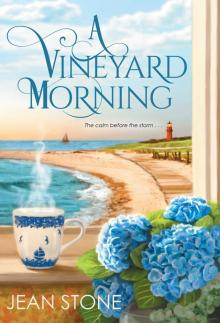 A Vineyard Morning
A Vineyard Morning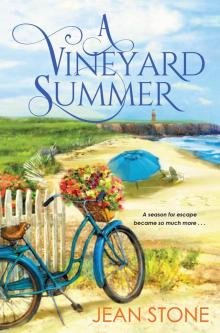 A Vineyard Summer
A Vineyard Summer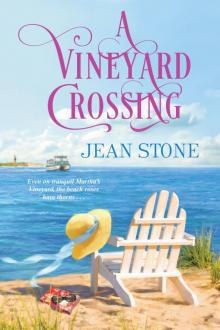 A Vineyard Crossing
A Vineyard Crossing A Vineyard Christmas
A Vineyard Christmas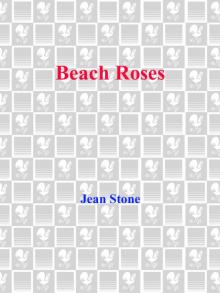 Beach Roses
Beach Roses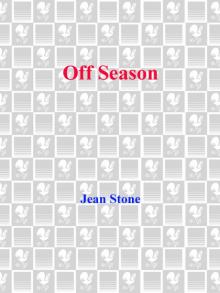 Off Season
Off Season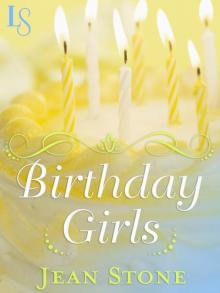 Birthday Girls
Birthday Girls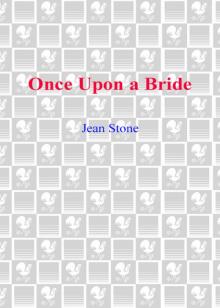 Once Upon a Bride
Once Upon a Bride Places by the Sea
Places by the Sea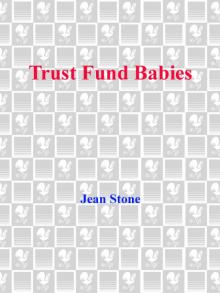 Trust Fund Babies
Trust Fund Babies The Summer House
The Summer House Tides of the Heart
Tides of the Heart Sins of Innocence
Sins of Innocence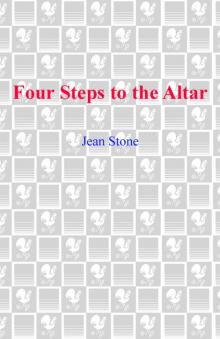 Four Steps to the Altar
Four Steps to the Altar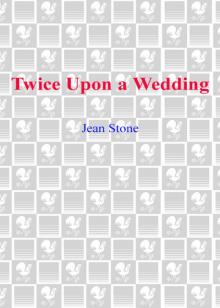 Twice Upon a Wedding
Twice Upon a Wedding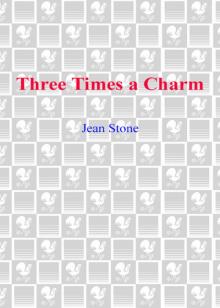 Three Times a Charm
Three Times a Charm